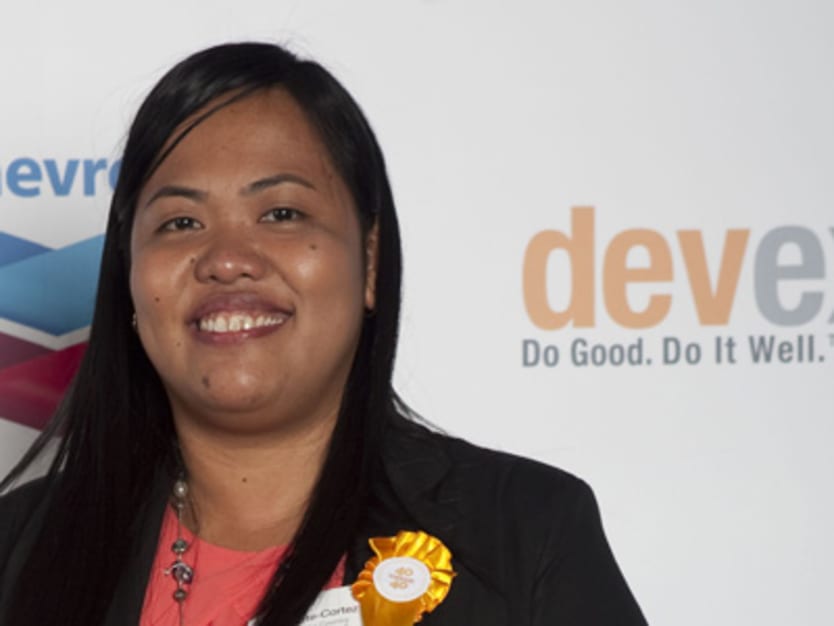
Vivien Suerte-Cortez has been working for the past 12 years for NGOs, government agencies and international organizations to promote accountability and transparency in development projects in the Philippines.
Suerte-Cortez was part of the REID Foundation team that pushed for tourism infrastructure projects worth $294 million into the national budget, and is now the manager for country innovations at the Affiliated Network for Social Accountability in East Asia and the Pacific Foundation. She is one the most influential development leaders aged 40 and under in Manila.
Devex is recognizing 40 of these young trailblazers in international development. They are social entrepreneurs, government leaders, development consultants, business innovators, advocates, development researchers, nonprofit executives and journalists.
We spoke with Suerte-Cortez about her passion about fighting corruption and why civil society must be involved.
You’ve been especially passionate about promoting government accountability and transparency throughout your development career. What drives this passion?
During the course of my career, I stumbled upon a simple truth — we are driven by our desire to live in a better society and to be governed by people whose values reflect our own.
My passion to promote transparency and accountability stems from my desire to see my country with a government that can deliver basic services to its citizens and uphold the rule of law. This can only happen if our public institutions are strong, and we, as citizens continue to support and constructively engage government to sustain the gains they’ve started towards good governance.
At ANSA-EAP, you are currently leading a project to promote citizen participation in the Philippines’ audit process. Are you encouraged by your progress so far? What have been some of the challenges you’ve faced in moving forward with the project?
ANSA-EAP promotes social accountability through constructive engagement between government and its citizens. The AusAID-funded Citizen Participatory Audit project was implemented in partnership with the Commission on Audit and other civil society organizations to enhance transparency, accountability, and participation in the public audit process. At this point, it is important to note that projects like these are made possible by public institutions that provide an enabling environment for citizen engagement. Suffice to say, COA’s openness to citizen participation has been very encouraging.
Although the audit process has yet to begin, the team’s greatest challenge is to make the partners understand and appreciate constructive engagement within the context of the project. Given the different perspectives of government and CSOs, the definition and operationalization of “partnership” has become the subject of several interesting discussions. While we realize that this is something that can’t be settled immediately, having shared experiences of undergoing the public audit process can be the tipping point to facilitate common understanding among all stakeholders.
By actively engaging with the Department of Public Works and Highways, you and your team were able to include 12 billion pesos worth of infrastructure projects in the 2013 national budget. What was the main challenge you encountered when you advocated for the inclusion of these projects, and how did you tackle it?
Since the start of the current administration, spaces for citizen participation in governance have opened up dramatically. By taking advantage of these reforms, REID Foundation was able to constructively engage both the DPWH and the Department of Tourism to identify infrastructure projects that would sustain economic growth in several areas around the country.
As one of the consultants of the team, I focused on forming strategic partnerships with CSOs and the private sector. The two main challenges I encountered were securing the buy-in of different stakeholders, and ensuring that the CSO-or private sector-identified infrastructure projects pass scrutiny by Congress.
To address these, technical assistance was given to different stakeholders on understanding the national budget and infrastructure planning processes. Each activity became a conscious effort to promote constructive engagement and bring together government reform champions, CSOs, and the private sector.
Eventually, the different stakeholders learned to use their political capital to secure support from their district representatives for their proposed infrastructure projects. This became expedient once the budget was endorsed to Congress.
As the frequency of the consultations grew and the quality of interactions deepened, the process of identification and prioritization of projects became transparent. Ultimately, having shared goals and several avenues for meaningful and constructive engagement at both the local and national levels became one of the key ingredients to the project’s success.
Read more about the Devex 40 Under 40 International Development Leaders in Manila.








